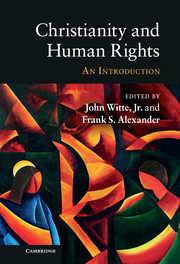Book contents
- Frontmatter
- Contents
- List of contributors
- Acknowledgements
- The first word: to be human is to be free
- Introduction
- FOUNDATIONS AND DEVELOPMENTS OF HUMAN RIGHTS
- 1 The Judaic foundation of rights
- 2 Ius in Roman law
- 3 Human rights and early Christianity
- 4 Human rights in the canon law
- 5 The modern Catholic Church and human rights: the impact of the Second Vatican Council
- 6 Rights and liberties in early modern Protestantism: the example of Calvinism
- 7 Modern Protestant developments in human rights
- 8 The issue of human rights in Byzantium and the Orthodox Christian tradition
- CHRISTIANITY AND THE MODERN HUMAN RIGHTS FRAMEWORK
- Biblical index
- Index
- References
5 - The modern Catholic Church and human rights: the impact of the Second Vatican Council
Published online by Cambridge University Press: 05 June 2012
- Frontmatter
- Contents
- List of contributors
- Acknowledgements
- The first word: to be human is to be free
- Introduction
- FOUNDATIONS AND DEVELOPMENTS OF HUMAN RIGHTS
- 1 The Judaic foundation of rights
- 2 Ius in Roman law
- 3 Human rights and early Christianity
- 4 Human rights in the canon law
- 5 The modern Catholic Church and human rights: the impact of the Second Vatican Council
- 6 Rights and liberties in early modern Protestantism: the example of Calvinism
- 7 Modern Protestant developments in human rights
- 8 The issue of human rights in Byzantium and the Orthodox Christian tradition
- CHRISTIANITY AND THE MODERN HUMAN RIGHTS FRAMEWORK
- Biblical index
- Index
- References
Summary
The emergence of human rights as a central theme in world politics is a recent phenomenon. The basic catalyst has been the UN Declaration on Human Rights (1948), the document which established the political-legal recognition of human rights in world politics. But even this truly innovative text remained at the margin of international relations for the next twenty-five years. Its ideas were honored in principle, but there was little effort to relate them in specific terms to the policies of states. This step, the inclusion of human rights in the foreign policy of states and international institutions, was taken in the 1970s. Since then both the study of world politics and its practice in political-strategic terms have been shaped – in part – by human rights. The literature on the topic has exploded into a cottage industry in the last forty years. Among the themes examined in the literature is the relationship, or the lack of it, between religious traditions and institutions and human rights. There is a spectrum of opinions on the question. Some acknowledge and welcome religious traditions (particularly in the West) as sources of human rights ideas and agents of human rights advocacy. Others see the human rights narrative in purely secular terms, belonging uniquely to the post-Enlightenment era.
- Type
- Chapter
- Information
- Christianity and Human RightsAn Introduction, pp. 113 - 134Publisher: Cambridge University PressPrint publication year: 2010
References
- 4
- Cited by



